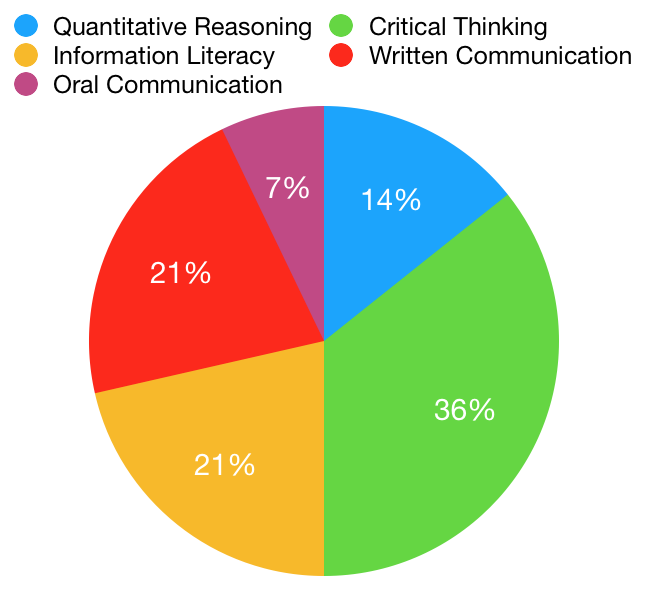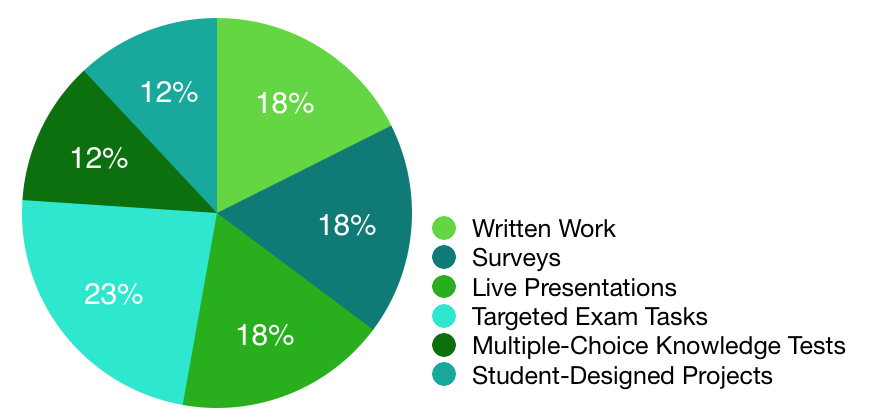Core Competency assessment is embedded in both General Education assessment and program learning outcome assessment. The characteristics associated with core competencies are derived from and related to the GE outcomes, described here. Note that these outcomes generally parallel those outlined in the AAC&U VALUE (Valid Assessment of Learning in Undergraduate Education) rubrics.
Information Literacy
-
Approach information/research gathering as a strategic process related to purposes, audiences, and contexts
-
Identify the range of sources available to address and inform inquiry
-
Situate sources in the context(s) in which they were created and are used
-
Evaluate the merit of sources and their use for different purposes, audiences, and contexts
-
Critically read, interpret, and evaluate primary and secondary sources
-
Locate, evaluate, interpret, use, and cite qualitative and quantitative evidence appropriate for purpose, audience, and context to support inquiry into and representation of ideas
-
Develop and undertake inquiry as a dialogue
Quantitative Reasoning
-
Critically evaluate evidence presented in numerical, statistical, cartographical, or graphical form.
-
Present clear reasoning containing quantitative information
-
Extract the information needed to solve a particular problem and determine whether a solution to a problem is reasonable by means of estimation
-
Create appropriate models to analyze a type of (quantitative) problem not seen before
-
Accurately manipulate symbolic information
Critical Thinking
-
Recognize and apply perspectives from different audiences and for different purposes to interrogate and evaluate questions or ideas
-
Systematically analyze evidence or data associated with the creation/production and use/consumption of different materials
-
Situate phenomena or ideas in broader contexts
-
Analyze one’s own perspective and the perspectives of others
Written Communication
-
Demonstrate the ability to conduct and represent inquiry in written form
-
Apply analyses of purposes, audiences, and contexts for written work
-
Critically evaluate and represent analysis of claims on the basis of evidence
-
Produce writing that uses rhetorical conventions appropriate for different purposes, audiences, and contexts
-
Produce writing that uses rhetorical conventions appropriate for languages other than English
Oral Communication
-
Use spoken language to explore and communicate with audiences for specific purposes (i.e, to inform, persuade)
-
Use language to explore and evaluate the merit of claims
-
Explain how concepts and phenomena relate to issues
-
Represent analyses orally
Core Competencies Assessment
During the 2022-2023 academic year, the Council on Assessment reviewed plans for 31 programs (from 20 departments), approving 16 and requiring revisions for 15. Most undergraduate assessments in the latest cycle (2020-2023) emphasized the core competency information literacy, followed reletively evenly by Critical Thinking, Oral and Written Communication. Graduate assessments focused mainly on research writing and pedagogy, with other programs collecting evidence around areas of specific subject-matter expertise and professionalism. (see figure below).

During this three-year cycle, six major categories of data were collected by the programs (see figure below). Five of these were forms of direct evidence: Targeted exam tasks such as proof-writing (Mathematics), text translation (German), and symbolic logic (Philosophy) test questions were utilized most often, along with occasionally multiple-choice knowledge tests (e.g. questions pulled from the standardized TUCE exam in economics) that allowed for performances to be compared nationally with other research university students.

Overall, departments have found their data on student learning reassuring, while also informative about specific areas where further inquiry or development might benefit their programs and students. Departments using standardized test questions or achievement rubrics to gauge program impacts, generally find UCSB students performing well or above standards of achievement set for those criteria. Departments tracking students’ growth as they progress through curricula, longitudinal data have shown observable gains regarding programs’ core objectives. For departments investigating students’ capacities to communicate learning via research, argumentation, and presentation, rubric-scores from faculty and audience members have evidenced both students’ academic understanding and communicative fluency. And departments who have collected additional data about students’ demographic contexts or subjective experiences in the program were able to glean additional insights, such as German receiving feedback about students' appreciation of translation exercises and desire more guided practice reading philosophical and literary texts.
In response to these findings, departments shared assessment results within the program to both faculty and students, used their findings to support internal reviews of program curricula, such as Mathematics creating a course outline document for its “Transition to Higher Mathematics” course, clarifying expectations and especially emphasizing the importance of proof-writing. Some programs have adjusted course assessments to emphasize areas which data have marked as educational priorities, such as Biology restructuring courses to include more formative assessments and 2-stage exams to lower pressure and increase learning opportunities. Still other departments are adjusting instruction itself, such as Italian which is transitioning grammar drills to independent work and reallocating that class time for in-person communication activities. And some departments are improving educational support for students, such as Linguistics, who is offering career and graduate school preparation documents, workshops, and speakers in their program.

In the upcoming cycle (2023-2026), most plans will focus on learning outcomes related to critical thinking (36%) with a moderate emphasis also on information literacy and written communication (21% each). In graduate plans for this cycle empirical research methods are now a top area of focus, alongside scholarly communication, with understanding of core knowledge areas and pedagocical skills as the focus of most other plans. In January 2025, we will begin Cycle 4 of our campus-wide PLO Assessments.
For program-specific details, see our full Council on Assessment Annual Report 2022 - 2023.
Council on Assessment Annual Report 2022 - 2023
